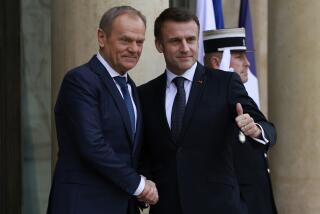U.S. Could Learn From EU’s Old World Charm in Foreign Policy
- Share via
This week, the European Union celebrates its historic expansion to 25 members from 15, welcoming former Soviet republics and satellites in the Baltics and Eastern Europe, Slovenia, Cyprus (at least the Greek half) and Malta. With a population of 455 million, an economy of $9 trillion and more than 1.5 million troops, Europe today is a superpower by any measure. And, ironically, it’s showing off that power by doing a better job than the United States in promoting what ought to be U.S. foreign policy objectives.
It is through the EU, for example, that European nations have learned to do together what none of them -- whether Britain, France or Germany -- can do alone. By exporting the EU legal code -- the acquis communitaire -- and deploying massive economic subsidies and incentives, Europe has managed to embrace unstable nations emerging from Soviet occupation, fostering democratic consolidation all the way to Russia’s border.
Collectively, Europeans have had a demonstrably more positive effect than Americans in some areas. Washington offered billions in aid to Turkey, yet Ankara spurned it and denied U.S. access to Turkish bases for the Iraq invasion. However, Turkey has abolished the death penalty, begun to implement laws to protect its Kurdish minority and lobbied for the recent Cyprus peace plan (although the deal collapsed) -- all in the name of joining the European club.
In Russia, despite President Bush’s trying to win over Vladimir V. Putin by turning a blind eye to his increasingly authoritarian behavior, Putin responded to last month’s NATO expansion with grumblings. The relationship between Washington and Moscow remains decidedly cool.
By contrast, Europe has used its economic leverage to keep the pressure on Putin to prevent Russian democracy from vanishing completely.
Worldwide, regional organizations such as the Assn. of Southeast Asian Nations and the African Union have begun to emulate Europe, pooling their resources to enhance their global reach. It could only help U.S. interests if these regions were able to resolve their internal differences.
In the area of human intelligence sources -- a U.S. weak spot -- more Europeans speak Middle Eastern languages, allowing them to infiltrate shadowy terrorist groups and capture dozens of suspected Al Qaeda members. The Spanish, French, Germans and Italians are spearheading an accelerated effort to create networks of intelligence collection and sharing. Having confronted separatist groups for years, Europeans wisely place emphasis on law enforcement in a manner that respects civil liberties, avoiding domestic backlash.
Emphasizing economic and political inducements over containment, it was Europe, not the U.S., that secured Iranian compliance with weapons inspections last year.
To prevent further chaos in Africa and other trouble spots, Europeans collectively give three times more development assistance to poor countries than the U.S. and provide 10 times the number of peacekeepers to United Nations operations. Indeed, it is Europe’s well-trained peacekeepers that the U.S. now needs in Iraq to keep the lid on the insurgency.
The U.S. has made little effort since the end of the Cold War to understand the dynamic process of European integration and its constructive role in world affairs. The Bush administration would be wise to encourage Europe’s independent approach to achieving common transatlantic interests, particularly because many societies consider the U.S. a greater threat to world peace than Al Qaeda.
More to Read
Sign up for Essential California
The most important California stories and recommendations in your inbox every morning.
You may occasionally receive promotional content from the Los Angeles Times.










